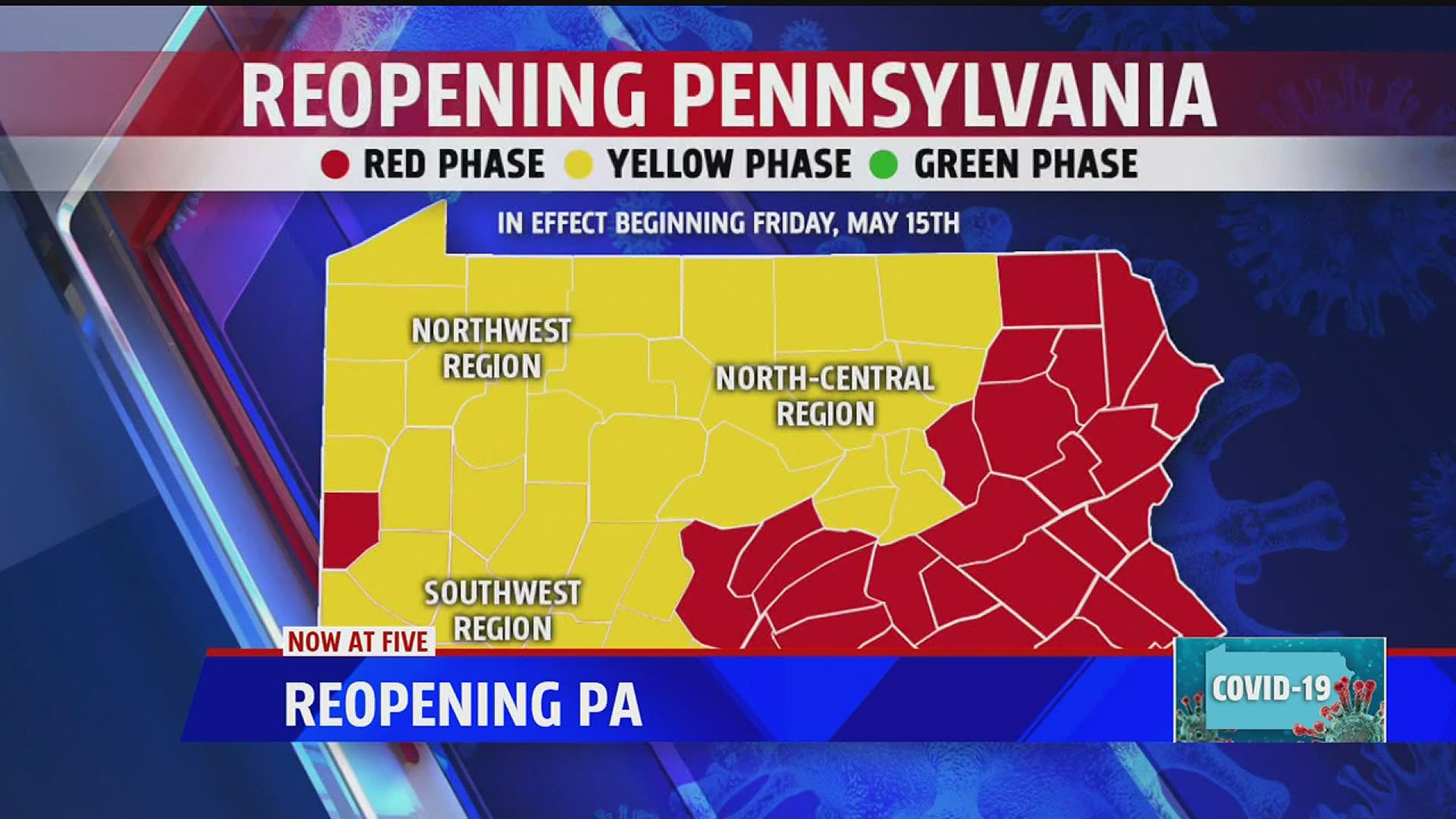PENNSYLVANIA, USA — Gov. Tom Wolf announced that 13 western Pennsylvania counties, including the heavily populated Pittsburgh metropolitan area, can shed his most restrictive pandemic orders on movement and businesses.
The counties announced Friday for reopening in a week are Allegheny, Armstrong, Bedford, Blair, Butler, Cambria, Fayette, Fulton, Greene, Indiana, Somerset, Washington and Westmoreland counties.
Those comprise nearly 2.7 million residents. The only western county held back, Beaver County, is home to perhaps the state’s worst nursing home outbreak. Dozens have died and a congressman is calling for an investigation.
Otherwise, the area of approximately 10,000 square miles (15,000 square kilometers), can reopen next Friday, the governor’s office told The Associated Press.
Also Friday, people in 24 counties across a swath of northern Pennsylvania began emerging from pandemic restrictions.
You can read the Governor's Press Release below:
oday Governor Tom Wolf announced 13 Pennsylvania counties will move to the yellow phase of reopening at 12:01 a.m. on Friday, May 15. Those counties include Allegheny, Armstrong, Bedford, Blair, Butler, Cambria, Fayette, Fulton, Greene, Indiana, Somerset, Washington and Westmoreland.
On May 1, the governor announced the 24 counties moving into the yellow phase of reopening beginning today. And, last evening, he and Secretary of Health Dr. Rachel Levine signed new orders – one for yellow phase reopening and one to extend the red phase counties’ stay-at-home order, which was set to expire last night, to June 4. The red phase stay-at-home order extension does not mean that other counties won’t move to the yellow phase in advance of June 4.
“The reopening plan prioritizes the health and welfare of Pennsylvanians by using a combination of factors to gauge how much movement a location can tolerate before the 2019 novel coronavirus becomes a threat,” Gov. Wolf said. “I’d like to emphasize that this plan is not a one-way route. We are closely monitoring the 24 counties in the yellow phase and will re-impose restrictions if danger arises.”
Gov. Wolf reminded residents and business owners that yellow means caution and that everyone needs to continue to be mindful of their actions and how they affect not only themselves, but their families, friends and community.
“Every contact between two people is a new link in the chain of potential transmission,” Wolf said. “And if the new case count begins to climb in one area, restrictions will need to be imposed to prevent local medical facilities from becoming overwhelmed. So, Pennsylvanians should continue to make good choices.”
Law enforcement remains focused on achieving voluntary compliance through education, but citations are possible for violators depending on the specific circumstances of an investigation.
In addition to the possible criminal penalties levied by law enforcement, there may be additional licensing consequences for violators, in part, through complaints filed by employees on the Department of Health portal that allows any employee who feels their employer is not providing a safe work environment to fill out an online form.
The Department of Health vets the complaints and investigates internally or sends the complaint to the appropriate state agency for investigation. For example, restaurant complaints are handled by the Department of Agriculture, which inspects those facilities; complaints about nursing homes are handled by the Department of Health, which inspects and licenses those facilities. Other involved agencies are the departments of State and Labor & Industry.
Concerns about a business reopening that may be in violation of stay-at-home or yellow phase orders should be made to local law enforcement non-emergency numbers or a local elected official.
Read Gov. Wolf’s Plan for PA here.
Read business guidance here.
Read CDC guidance for child care centers here.
Read FAQs here.
View the Carnegie Mellon University Risk-Based Decision Support Tool here.
SOURCE: Governor's Office

